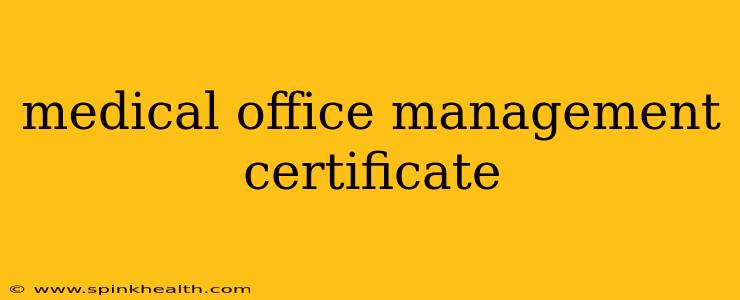The bustling atmosphere of a medical office, the constant flow of patients, the intricate dance of scheduling and billing – it's a world demanding organization, efficiency, and a keen eye for detail. If the rhythm of a medical office resonates with you, then a medical office management certificate might be your ticket to a rewarding and impactful career. This isn't just about filing and scheduling; it's about being a vital cog in the smooth-running machine of healthcare.
My journey into the world of medical office management began unexpectedly. I was working in administrative support, feeling unfulfilled, when a friend, a medical assistant, mentioned the constant need for organized, efficient office managers. Intrigued, I started researching, and the world of medical office management certificates opened up before me. This isn't just a certificate; it's a passport to a career that combines administrative prowess with a deep understanding of the healthcare industry.
What Does a Medical Office Management Certificate Program Entail?
Most medical office management certificate programs are designed to equip students with the practical skills needed to succeed in this dynamic field. Think beyond basic office skills; this is a focused education that delves into the unique challenges and opportunities of the medical setting. You can expect to learn about:
- Medical Terminology: This is foundational. You'll need to understand the language of medicine to effectively communicate with doctors, nurses, and patients.
- Medical Billing and Coding: This is crucial. Mastering medical billing and coding procedures ensures accurate claims processing and timely reimbursements, which are vital to a clinic's financial health.
- Electronic Health Records (EHR) Software: Proficiency in EHR systems is essential in today's digital healthcare landscape. You’ll learn to navigate these complex systems efficiently and securely.
- Insurance and Reimbursement: Understanding insurance plans, claim submission, and denial management is critical for keeping the administrative side of the medical practice running smoothly.
- Office Management and Administration: This covers all aspects of daily office operations, including scheduling appointments, managing patient records, and handling communications.
- Practice Management Software: Many offices rely on software solutions to streamline operations, so learning to use these tools is important.
- Compliance and Regulations: Navigating HIPAA regulations and other healthcare compliance requirements is essential to protect patient confidentiality and avoid legal issues.
What are the Benefits of Getting a Medical Office Management Certificate?
Increased Job Prospects: The healthcare industry is constantly growing, creating a significant demand for skilled medical office managers. A certificate demonstrates your commitment to the field and makes you a more competitive candidate.
Career Advancement: Many medical office managers start in entry-level positions and progress to supervisory roles or even practice management positions with further experience and training.
Higher Earning Potential: A medical office management certificate can lead to a higher salary compared to similar administrative roles.
Job Satisfaction: The chance to contribute directly to the smooth operation of a healthcare facility can be profoundly satisfying. Knowing your work makes a difference in people's lives is a powerful motivator.
How Long Does it Take to Earn a Medical Office Management Certificate?
The duration of a medical office management certificate program varies depending on the institution and program structure. Some programs can be completed in as little as a few months, while others may take a year or longer. The program length often correlates with the intensity of the coursework.
What are the Career Paths After Obtaining a Medical Office Management Certificate?
Graduates with medical office management certificates often find employment in various healthcare settings, including:
- Physician's Offices: Managing schedules, handling billing, and supporting the administrative needs of doctors' practices.
- Clinics: Coordinating patient care, managing administrative tasks, and assisting medical staff.
- Hospitals: Working in administrative support roles within hospital departments.
- Dental Offices: Applying similar skills in a dental setting.
Is a Medical Office Management Certificate Worth It?
The answer is a resounding yes, especially if you're passionate about healthcare and enjoy the challenges of administrative work. A medical office management certificate is a smart investment that can open doors to rewarding career opportunities in a thriving industry. It's a testament to your commitment and provides the practical skills you need to succeed in this dynamic field. My own experience is proof – that small step led to a fulfilling career, one that blends my love of organization with a deep sense of contributing to something meaningful. The path to success in medical office management starts with that first step – enrolling in a certificate program. What are you waiting for?

